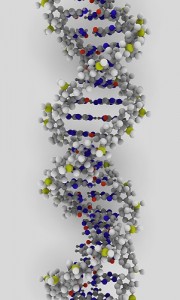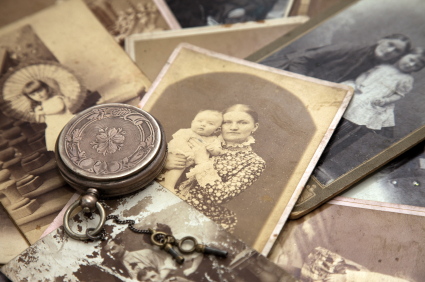by Michelle Sutton-Kerchner
Termed “the fat gene,” research continues to prove it exists. However, it does not necessarily determine the fate of your weight. Empower yourself, even when the odds seem to weigh heavily against you …
Specific genes are identified as weight-effectors. Scientists even determined to which chromosomes some of these genes are attached. You don’t need to be in a lab setting to notice a familial tendency to a specific body type, be it skinny or stocky. A glance around a local ice cream shop often shows a variety of folks who should spend a little more time on the treadmill. Ironically, the customers in the sneaker warehouse appear as if they ran there and mostly everywhere else. The conclusion: Yes, there is a fat gene. No, it does not mean you have to be overweight.
It Comes Naturally, or Not
Just as some are inclined mathematically and others linguistically, our fate is not sealed by these natural characteristics. There are multiple factors– a lifetime and perhaps lifetimes before ours– that make up who we are and how we live. By reminding ourselves we control our destiny, we can do just that. Predispositions do not confirm the future, otherwise we all would be wearing purple scarves, sitting in booths, and fortune-telling.
Admittedly, some people do possess a fast metabolism and perhaps a long line of skinny relatives who seem to reinforce it. More power to the slightly overweight soul who prides himself on avoiding obesity in a family of 3XLs. It can be done, although perhaps not as easily.
The Corrected Cynic
To the hardcore jock who insists waistline has nothing to do with genetics and everything to do with laziness, scientific fact has corrected this falsehood. Fat-encouraging genes are thought to affect hormones related to hunger and how that hunger is satiated.
 A person genetically predisposed to gaining weight is proven to have more difficulty controlling hunger and resisting temptation. Some fat-encouraging genetic mutations produce a resistance to the hunger-suppressing hormone leptin. A person with these genes also struggles more to lose weight once gained than those without such genetic predisposition. Genetics can affect one’s weight, but only to an extent. Learned behaviors and lifestyle habits play an essential role.
A person genetically predisposed to gaining weight is proven to have more difficulty controlling hunger and resisting temptation. Some fat-encouraging genetic mutations produce a resistance to the hunger-suppressing hormone leptin. A person with these genes also struggles more to lose weight once gained than those without such genetic predisposition. Genetics can affect one’s weight, but only to an extent. Learned behaviors and lifestyle habits play an essential role.
Obese parents may raise obese children, yet not necessarily because they inherited their genes. Unlike eye and hair color, weight is not a fully inherited trait. It is influenced by how one is raised, which includes diet, physical activity level, and healthy habits. Without intending harm, we pass along behaviors; we nurture into specific ways of living. Is there an abundance of fast-food consumed? Are sugary treats used as rewards? Is TV automatically turned on? These can have a lifelong influence on a person’s health as much as genes.
If you were raised in an environment where fruit was scare and candy abundant, consider meeting with a nutritionist. Many simply do not know a different way of eating. Often, it is a matter of learning and clarifying misconceptions. One member on a weight-loss journey discovered an easy tweak to what she thought was a healthy snack. A switch from standard flavored yogurt, which is high in sugar, to plain with fresh fruit made a sugary snack healthy.
Surround yourself with a community that thrives in health. You are who you hang around! If your family was not the best example, lead them to better. Assign yourself the task of breaking boundaries and preconceived ideas. It may not be what is in your DNA, but rather what is in your pantry.
Keep Trying and Evolving
If you posses the fat mass and obesity-associated (FTO) gene, you are not alone. Scientists estimate about 65 percent of people of European or African descent and 44 percent of Asians carry some version of the FTO gene. Yet, the gene specifically was not what doomed those in the studies. The knowledge of possessing it was.
In a self-fulfilling surrender to fate, study participants who learned they had the FTO gene or similar binged over a 90-day period. They consumed more fatty foods than in previous months, assuming a lack of control over their weight. Accountability was lost. A newer investigation showed physical activity, even in small doses, counteracted the genetic predisposition.

A review of 218,000 FTO carriers showed genetics were subverted by about 30 percent in those who performed only one hour of moderate physical activity per week. This shows regular exercise can counteract fat-encouraging genes. Researchers speculate physical activity affects how these genes function. Exercise allows maintenance of a healthy weight, even if genetics threaten otherwise.
The knowledge that genes are partially at play in who is susceptible and resistant to weight gain is especially exciting in the fight against childhood obesity. The insight is leading to new therapies and interventions specific to these individuals. Safer, more effective weight-loss programs can be initiated earlier. It is usually easier to avoid gain initially than lose weight later.
Outcomes have been encouraging. Those who feel doomed to weight struggles should be encouraged by these findings. Knowing you have control over your weight, your overall well-being and health, creates the mentality needed for positive action.
Take preventative measures. Just as someone with a family history of lung cancer would be wise to avoid cigarette smoking, someone with overweight relatives might avoid all-you-can-eat buffets and excessive couch-time. The next time you envy that skinny friend who puts away pints of Ben & Jerry’s, ask what she spent her day doing. It probably included an hour of Zumba followed by her best lap time in the pool.

Determine which weight-control and weight-loss strategies work for you. Live by them. You, too, may get away with a scoop of life’s sweet stuff, if you do the time. And make sure “the time” is an activity you enjoy. Discover your fitness niche, build on it, and evolve with it.
Awareness that obesity runs in the family is helpful. It should be the catalyst that brings you to the Center, not the kitchen.
Sources
“Genes Pinpointed for Common Childhood Obesity,” by Brenda Goodman at www.webmd.com.
“The Myth of the Fat Gene,” by Christopher Wanjek at www.livescience.com.
“Staying Trim When Fat Runs in the Family,” by Gretchen Reynolds at www.nytimes.com.
“What Is Your Weight Destiny?” by Stephanie Dolgoff at www.fitnessmagazine.com.
Image Credits
DNA strand: http://www.flickr.com/photos/ynse/542370154/
Plank stretch: http://www.flickr.com/photos/lululemonathletica/3831691794/
Tall, thin & short, fat trees: http://www.flickr.com/photos/33037982@N04/5124328536/
 Fitness & Wellness News Your Source for Fitness News, Wellness News, Health News, and Nutrition News!
Fitness & Wellness News Your Source for Fitness News, Wellness News, Health News, and Nutrition News!




